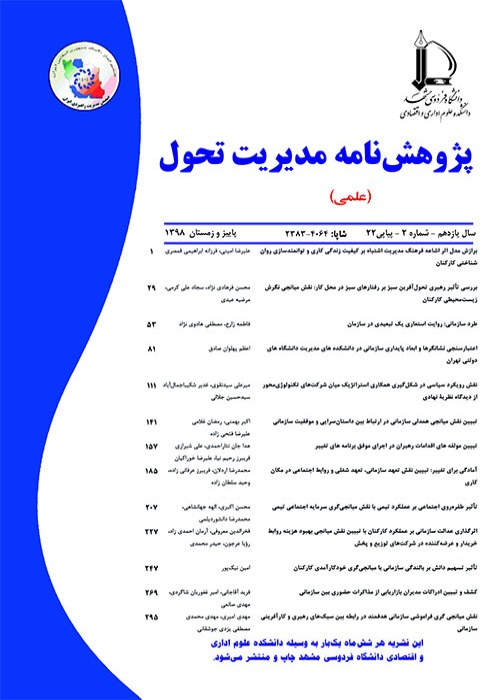Identifying the Personality Characteristics of Knowledge Workers
The last decade has seen many changes in the global business environment. thus, technology-driven businesses have been replaced by knowledge-based businesses. human resources are now the most important asset of organizations. but not all employees are a source of competitive advantage for organizations. rather, knowledgeable employees can create competitive advantage and added value for the organization. therefore, managers of organizations must know how to provide a suitable environment and opportunities for greater participation of knowledgeable employees in the organization, because the processes of identifying, recruiting, training, managing, and retaining are more difficult for knowledgeable staff than for other employees. organizations should know more about the personality and behavior of knowledgeable employees and develop appropriate programs to attract, train and interact with them as well as adopt necessary strategies to make them satisfied and loyal.
By examining most of the key factors affecting the success of knowledge management, the human factor or knowledge staff is common in most models. the term knowledge worker was first introduced by peter drucker. in his opinion, a person who works with information and develops or applies knowledge in the workplace is a knowledge worker. knowledge employees are employees who have a high level of education and experience and think about life and are mainly engaged in technical and managerial positions. on the other hand, they can have a major impact on the company and its performance. the nature of these employees requires a high level of autonomy and knowledge workers usually need to work with colleagues in similar departments, other departments, or even with employees of different organizations. knowledge workers do not repeat the same task every day, so they do not follow the instructions given to them, but use their technical and intellectual knowledge to perform tasks. personality is one of the most important factors that can be evaluated in the first call, the job seeker. because it seems difficult to pay attention to the applicant's situation in many environments and situations, a person's personality information can be used to predict his or her future behavior. the five-factor model, mbti model, and enneagram typology model are some of the most important personality models used in this study.
This research was a mixed study with the interpretive philosophy in its qualitative phase (descriptive phenomenology). in the quantitative phase of the research, the pragmatism philosophy was used. the statistical population of the qualitative phase was comprised of experts such as knowledge management experts in 23 companies in Mashhad city having R&D departments. The sampling method was snowball continued to 21st interview to reach theoretical saturation. The qualitative data collection tool was semi-structured interviews and gathered data were analyzed using MAXQDA software.
Descriptive phenomenology was conducted based on the colaizzi approach. the following steps were followed: first, the interviews' content was converted from audio to text mode. at this step, a total of 270 open codes were extracted. in the next step, the codes list was referenced and some codes were integrated with each other. also, irrelevant and duplicate ones were removed from the existing list, and categories were determined based on expressions and codes extracted from previous steps. finally, eleven personality categories were extracted including introversion, conscientiousness, judgment, realism, neuroticism, incompatibility, conservatism, narcissism, thinking, self-control, and openness.
When hiring knowledge staff, routine personality tests should be performed to select and attract people with the closest personality type to knowledge jobs. one of the most important results of this study was identifying the introversion of knowledge staff as a key personality dimension. due to the characteristics of introversion, it is appropriate to try to provide a suitable work environment for introverts such as a place for mental resting, walking, exercising, and even sleeping at work. in regard to knowledge employees' internal locus of control, managers are recommended not to externally monitor and control their work process and, instead, control their work output. in regard to the psychotic characteristics of knowledge workers, it is suggested to avoid imposing stress and work pressure on and setting a short period of time for them. in general, organizational processes should be redefined for knowledgeable employees. even if necessary, two types of processes should be implemented for knowledge and non-knowledge employees. due to the thinking characteristic, it is suggested to provide necessary conditions and situations for knowledge employees to think.
- حق عضویت دریافتی صرف حمایت از نشریات عضو و نگهداری، تکمیل و توسعه مگیران میشود.
- پرداخت حق اشتراک و دانلود مقالات اجازه بازنشر آن در سایر رسانههای چاپی و دیجیتال را به کاربر نمیدهد.




